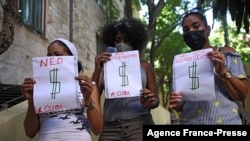Cuba's government on Tuesday rejected a request from the opposition to stage a protest on November 15, claiming the organizers are backed by the United States and want to overthrow the regime.
The proposed demonstrations would follow unprecedented anti-government protests that erupted on July 11 in around 50 Cuban cities.
"The promoters and their public representatives, some of whom have links with subversive organizations or agencies financed by the American government, have the clear intention of promoting a change in Cuba's political system," the government said in a statement on the official Cuba debate website.
Organizers wanted to stage protests in six of the island's 15 provinces in a call against violence and for change.
But the communist government said the reasons were illegitimate and constituted a "provocation," adding that the new constitution adopted in 2019 states that the current socialist system is "irrevocable."
The protest request published on social media pointed to Article 56 of the new constitution that protects the right to meet, protest and to associate for lawful and peaceful purposes.
"Even though that is a constitutional right, it cannot be exercised in detriment to other rights," the government said in response.
Film director Yunior Garcia, who organized the planned Havana protest, lashed out at the government's reasons for refusing the requests.
"Whatever the Cuban does, they always say the idea came from Washington. It's as if we don't think, as if us Cubans don't have any brains," he said. "Of course, every sane Cuban wants change for the better. They want democracy in Cuba. More progress. More freedom."
In Washington, State Department spokesman Ned Price said the July outpouring on the streets "was not about the United States."
"The prohibition on peaceful protest that we've seen, all of this reminds us that it is a Cuban people who are paying dearly in their fight for freedom, their fight for dignity," Price told reporters. "We call for the government in Havana to respect the fundamental freedoms and the fundamental rights of the Cuban people."
The opposition protest was originally slated for November 20, but it was changed after the government last week declared the day "National Defense Day" and said it would be preceded by two days of military exercises.
"We could not be irresponsible. We didn't want any violence. We didn't want Cubans fighting each other, and we couldn't send protesters into a street battle against the army that could respond with violence," Garcia said.
The government crackdown over the July protests left one person dead, dozens injured and more than 1,000 people detained, several hundred of whom remain behind bars.





